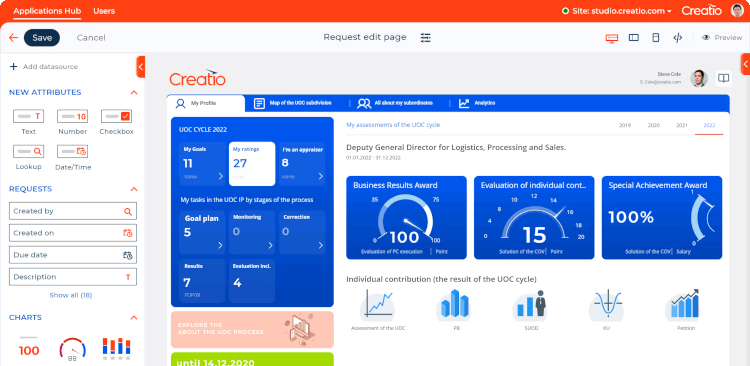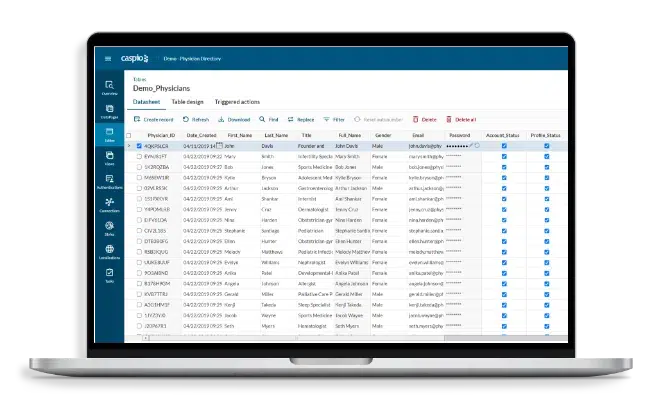No-Code Operating Systems for Open Platform Database Creation: Conserve Time and Resources
No-Code Operating Systems for Open Platform Database Creation: Conserve Time and Resources
Blog Article
Checking Out the Benefits of Scalable Data Sources That Require No Coding Skills for Reliable Data Administration Solutions
The development of scalable databases that get rid of the requirement for coding skills provides a transformative possibility for companies looking for effective information management services. As we take into consideration the ramifications of such improvements, it ends up being important to check out exactly how they can reshape the landscape of data management and drive sustainable growth in an affordable environment.
Enhanced Accessibility for Users
Boosted ease of access for individuals is a vital aspect of scalable data sources, ensuring that data management systems are user-friendly and user-friendly. In a period where data-driven choices are critical, ease of access permits a bigger series of users, including those without extensive technological know-how, to involve with database systems properly. This democratization of data accessibility helps with boosted collaboration throughout divisions, empowering staff members to remove understandings and make notified choices.
User-friendly interfaces, such as drag-and-drop attributes and aesthetic information depiction, simplify complicated information communications. These improvements reduce the learning curve connected with conventional data source monitoring, making it possible for customers to focus on leveraging data instead of facing technical intricacies. Scalable data sources usually include customizable control panels and real-time analytics, providing users with instant understandings customized to their details demands.

Cost-Effectiveness and Source Cost Savings
Reliable information monitoring not just depends upon accessibility yet also on cost-effectiveness and source savings. Scalable databases created for individuals without coding abilities substantially decrease economic concerns usually connected with traditional data source management systems. By removing the demand for specialized shows expertise, companies can allot their resources a lot more successfully, concentrating funds on core business tasks instead of substantial training or working with knowledgeable workers.
Furthermore, these data sources typically use cloud-based services, which further lower costs connected to hardware and maintenance. Organizations can scale their data source solutions according to their demands, staying clear of the expenses sustained from over-provisioning resources. This adaptability implies organizations can adjust to transforming demands without incurring unnecessary prices, resulting in considerable long-term financial savings.
Furthermore, straightforward interfaces improve data entrance and management procedures, reducing the time invested in administrative jobs. This effectiveness converts right into labor expense savings, enabling groups to concentrate on tactical campaigns instead than routine maintenance. In general, adopting scalable databases that call for no coding skills fosters a more cost-efficient method to information administration, making it possible for organizations to maximize their resources while keeping high degrees of functional effectiveness.
Improved Partnership Across Teams

Furthermore, scalable data sources help with smooth communication amongst employee. With easy to use interfaces that need no coding skills, employees can easily create, modify, and share reports or control panels tailored to their particular demands. This democratization of data empowers non-technical users to contribute insights, enhancing the collaborative environment.
Furthermore, these databases sustain concurrent accessibility, allowing numerous individuals to work with the exact same dataset concurrently. This feature boosts productivity, as teams can engage in joint data analysis without the danger of variation control issues. The ability to leave notes or remarks directly within the data source even more advertises discussion and makes clear information analyses.
Streamlined Data Administration Processes
In today's data-driven setting, organizations identify the necessity of structured information administration refines to optimize effectiveness and precision. By leveraging scalable databases that require no coding skills, organizations here can streamline their data handling and lower the complexities normally related to conventional database systems. This access empowers non-technical users to involve straight with information, promoting quicker decision-making and reducing reliance on specialized IT employees.
Streamlined data management processes enhance workflow by automating regular tasks such as data entry, recognition, and coverage. Automated information integration makes sure that information from different resources is aggregated effortlessly, eliminating silos and promoting an unified sight of vital service metrics (no-code). In addition, straightforward interfaces enable personnel to manipulate data easily, allowing them to create understandings that drive critical efforts without the need for considerable training.
This efficiency not just increases functional procedures yet additionally reduces the possibility for human error, making certain that information continues to be reputable and precise. Inevitably, streamlined information monitoring procedures via scalable databases result in enhanced performance, enabling companies to concentrate on core activities while making certain that their data monitoring practices are efficient and effective.
Scalability for Growing Businesses
For expanding business, the capacity to scale up or down is critical. A scalable data source can take care of an increase of information generated from brand-new consumers, items, or services, making certain that organization operations stay continuous. Additionally, these data sources supply the capability to handle peak tons effectively, which is vital throughout periods of rapid growth or seasonal spikes.
Additionally, lots of scalable data source options are developed with straightforward user interfaces that require no coding skills, equipping non-technical staff to handle data efficiently (no-code). This democratization of information monitoring permits companies to allot sources strategically and decrease reliance on specialized IT personnel
Inevitably, taking on a scalable database not just improves operational performance yet also cultivates an environment where services can introduce and evolve without the restraints of conventional visit this website database systems. This adaptability placements organizations for long-lasting success in today's affordable landscape.
Final Thought
In conclusion, scalable databases that need no coding abilities provide considerable benefits for reliable information management. By improving data administration processes and providing scalability for expanding organizations, such remedies make it possible for organizations to adjust to changing demands properly.
Boosted ease of access for individuals is a critical aspect of scalable databases, ensuring that data management systems are intuitive and straightforward.Easy to use user interfaces, such as aesthetic data and drag-and-drop attributes representation, streamline intricate data communications. Generally, adopting scalable data sources that require no coding abilities fosters a more cost-efficient technique to data monitoring, allowing organizations to maximize their sources while maintaining high degrees of operational efficiency.
By leveraging scalable databases that call for no coding skills, businesses can streamline their information handling and reduce the complexities commonly linked with conventional data source systems - no-code.Structured data management procedures enhance operations by automating routine tasks such as data entry, recognition, and reporting
Report this page